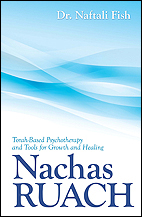Search results ({{ res.total }}):
The 'Nachas Ruach' Treatment Model
Excerpts from "Nachas Ruach: Torah-Based Psychotherapy and Tools for Growth and Healing"
Preface:
A Way Out of Addiction for Orthodox Jews?
 From Internet addiction to marital and family problems, from "teens at risk" to the psychological challenges facing those who are frum from birth and baalei teshuvah, today's changing world can be a confusing one. The religious Jewish community is also not immune to many sensitive contemporary issues, which can no longer be ignored. Yet sadly, some people who need psychological advice refrain from seeking it, believing that contemporary psychology and psychiatry are antagonistic to Yiddishkeit.
From Internet addiction to marital and family problems, from "teens at risk" to the psychological challenges facing those who are frum from birth and baalei teshuvah, today's changing world can be a confusing one. The religious Jewish community is also not immune to many sensitive contemporary issues, which can no longer be ignored. Yet sadly, some people who need psychological advice refrain from seeking it, believing that contemporary psychology and psychiatry are antagonistic to Yiddishkeit.
This important work by well-known therapist Dr. Naftali Fish offers a solid conceptual framework for understanding the relationship between Torah and psychology - including the Twelve Step program - showing clearly where they are compatible and where they are not. Dr. Fish is uniquely qualified to bridge this gap, as an Orthodox Jew grounded in Torah Judaism and the wisdom of our sages, and as a licensed clinical psychologist living in Jerusalem, with over twenty-five years' experience working with a variety of clinical issues, including the treatment of addictions and healing the inner wounded child. Here he presents the Nachas Ruach Treatment Model (NRTM), an innovative, effective approach that integrates Torah values and spirituality within the context of professional psychotherapy and hypnotherapy, as illustrated by intriguing case studies.
This book is a must-read for all professionals in the field of mental health, as well as for rabbis, educators, students studying psychology, and educated lay readers. Blending theory and practice, this book also provides practical tools and exercises for personal growth that anyone can gain from in their daily lives.
Preface:
A Way Out of Addiction for Orthodox Jews?
 From Internet addiction to marital and family problems, from "teens at risk" to the psychological challenges facing those who are frum from birth and baalei teshuvah, today's changing world can be a confusing one. The religious Jewish community is also not immune to many sensitive contemporary issues, which can no longer be ignored. Yet sadly, some people who need psychological advice refrain from seeking it, believing that contemporary psychology and psychiatry are antagonistic to Yiddishkeit.
From Internet addiction to marital and family problems, from "teens at risk" to the psychological challenges facing those who are frum from birth and baalei teshuvah, today's changing world can be a confusing one. The religious Jewish community is also not immune to many sensitive contemporary issues, which can no longer be ignored. Yet sadly, some people who need psychological advice refrain from seeking it, believing that contemporary psychology and psychiatry are antagonistic to Yiddishkeit.
This important work by well-known therapist Dr. Naftali Fish offers a solid conceptual framework for understanding the relationship between Torah and psychology - including the Twelve Step program - showing clearly where they are compatible and where they are not. Dr. Fish is uniquely qualified to bridge this gap, as an Orthodox Jew grounded in Torah Judaism and the wisdom of our sages, and as a licensed clinical psychologist living in Jerusalem, with over twenty-five years' experience working with a variety of clinical issues, including the treatment of addictions and healing the inner wounded child. Here he presents the Nachas Ruach Treatment Model (NRTM), an innovative, effective approach that integrates Torah values and spirituality within the context of professional psychotherapy and hypnotherapy, as illustrated by intriguing case studies.
This book is a must-read for all professionals in the field of mental health, as well as for rabbis, educators, students studying psychology, and educated lay readers. Blending theory and practice, this book also provides practical tools and exercises for personal growth that anyone can gain from in their daily lives.
Continuation of "Step 1"
An important principle in Jewish thought related to change enjoins the individual to take immediate action to cease his negative behavior and begin to act in a positive direction: סור מרע ועשה טוב, "Depart from evil, and do good" (Psalms 34:15). The Twelve Steps also start from this perspective. The addict initially needs to stop his active addiction ("depart from evil") and then begin to learn how to live in a better way ("do good"). In contrast, the classical Freudian view of addictions believed that the addict first needed to work through the unconscious conflict, which was thought to be the source of the addiction. In the best case scenario, this process would take considerable time before the active addiction would "fade away" because it was no longer "being fuelled" by the unconscious etiology or source. The problem involved in using this approach was that in the meantime the addict would still be "out of control," continuing to act in ways that were destructive to himself, his family, and his environment.
Judaism also stresses that teshuvah means first stopping the behavior and then trying to understand and modify its deeper roots. The Rambam explains this further: "What constitutes teshuvah? That a sinner should abandon his sin [in action] and remove itfrom his thoughts.[1]
[1] Rambam, Hilchos Teshuvah 2:2.